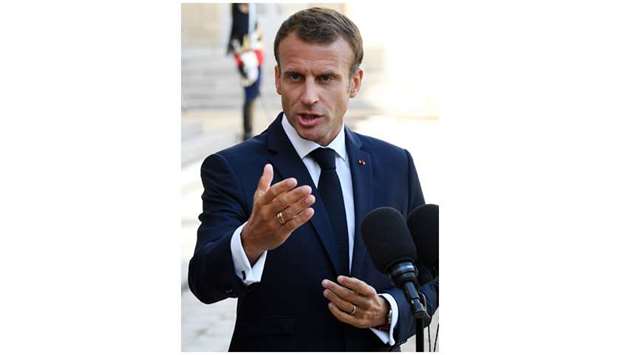He told reporters in Paris that he had cancelled today’s visit to Biarritz, where he was expected to discuss the G7 summit that France will host there next year, in order to hold talks with ministers about the planned public consultation.
The president said that it was a “normal re-prioritisation of my agenda” as he wanted to “finalise and clarify the rules” for the process by tomorrow.
Protesters wearing yellow safety bibs have taken to streets and blocked roads and roundabouts around France since mid-November.
The largely leaderless movement initially opposed planned fuel tax rises – now cancelled – but has since raised a wider range of demands including higher wages, tax cuts, and a constitutional amendment to allow voters to initiate referendums on policy issues.
Thousands of protesters took to the streets again across France on Saturday.
Their numbers were, however, sharply down on previous weeks, according to officials.
In Paris, protests were largely calm, after violent clashes with police on previous Saturdays.
Macron has also promised measures to meet protesters’ more immediate concerns, including a €100-per-month ($113) pay rise for low-paid workers and tax breaks on overtime payments, end of year bonuses and some pensions.
The government said last week that the national consultation would focus on four main areas, including housing, heating and transport costs; fairer and simpler taxation; democracy and citizenship; and the reorganisation of public services.
The list did not include immigration, which Macron had mentioned as a possible issue for the consultation earlier in the week.
Some on the French left reacted with dismay after the president raised the issue in the context of France’s national identity.
Macron’s remarks in Paris yesterday came after Prime Minister Edouard Philippe confirmed on Sunday evening that the total cost of the immediate concessions would be about €10bn.
A series of tax measures and cuts to public spending would recoup about €4bn of that cost, Philippe told business newspaper Les Echos.
The government intended to cut €1bn to €1.5bn of public spending, as well as saving €1.8bn by delaying planned cuts to corporate taxes, Philippe said.
Another €500mn would come from a new tax on major digital economy firms, the premier said, confirming that France planned to put its own tax in place ahead of any agreement at European level.
The overall impact would bring France’s budget deficit in 2019 to 3.2% of gross domestic product (GDP), the premier said – over the EU’s official ceiling of 3%, which Macron had previously insisted on sticking to.
France got its deficit below 3% last year for the first time since before the global economic crisis of 2008.
As a result, in June, the EU ended a disciplinary procedure over excessive deficits launched against Paris in 2009.
However, French ministers have said the deficit hike will be for one year only, as next year’s deficit figure includes 0.9 percentage points attributable to a one-off change in employers’ social charges.
Philippe rejected any comparison with neighbouring Italy, whose populist government recently backed down in a row with the European Commission over plans to raise its deficit to 2.4% in an expansionary budget.
Italy’s public debt, at more than 130% of GDP, is much higher than France’s, at just under 100%, although both are well over the EU target figure of 60%.
“Our plans are very consistent, unlike the ideas proposed by the various parties in the Italian government,” Philippe argued.
“We are going to continue modernising the country with important reforms such as [those to] unemployment insurance, the public service and pensions.”

